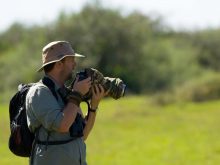Paul French
Freelance Ecological Consultant
Easington, East Yorkshire, UK
Find Paul on Twitter @nomadbirder
Involved with the BOU as:
Committee member of BOURC
BOU member since: 2015
Most likely to be found . . .
. . . Birding at Spurn
Why are you a member of the BOU?
Being the Chairman of the British Birds Rarities Committee (BBRC), I have an ex officio seat on BOURC.
What is your role on the BOU’s Records Committee?
I act as a conduit between BOURC and BBRC.
What do you enjoy most about your involvement with the BOU?
Learning from the others on BOURC and having an input into the assessment of birds new to Britain.
When did your interest in ornithology begin?
I first lifted a pair of bins when I was about 8 years old, and have been birding ever since. This graduated into more serious ornithology throughout university by taking on various voluntary surveys, before starting a career in conservation on leaving university. After over ten years with RSPB and other NGO’s, I became a freelance ecological consultant in 2011.
What is your most memorable bird-y experience?
Too many to even try and narrow it down to one, so here’s a selection of things that immediately jump to mind.
Seeing the migration of 85,000 Honey Buzzards in Georgia in one day
Finding Scotland’s first Black-faced Bunting on Fair Isle
Colour ringing of Red-necked Phalaropes on Fetlar
Living on Fair Isle for two seasons and all that entailed
Watching the display of the Western Parotia in West Papua
Finding Britain’s fifth Buff-bellied Pipit in Lincolnshire
Finding a Fea’s Petrel off the Scillonian ferry
What is your favourite outdoor place and why?
Too many to mention, planet Earth is such an amazingly diverse and wondrous place. However, I can often be found in the mountains and steppes of Georgia, the deserts of Israel or a jungle somewhere new.
What do you predict to be the future big research areas in ornithology?
Population responses to climate change; migration physiology and mechanisms; finding innovative ways to increase food production in developing countries in line with maintaining bird populations; engaging more with developers, planners and civil engineers in bringing nature more into the built environment; reduce the impact of modern farming on bird populations
What would you say to anyone considering research in ornithology?
Do it, the world needs you.
If you could visit anywhere in the world, that you haven’t yet been to, where would it be and why?
Antarctica and the islands of the Southern Oceans, such as South Georgia, Amsterdam, Heard etc. Seabirds are probably my favourite groups of birds, and to see the huge seabird colonies and experience the wildlife of the Southern Ocean would be a dream come true.
What are the big conservation challenges in the next decade?
Getting politicians to actually care about conservation and the environment rather than just paying lip service to it when it suits them. Stopping deforestation, drainage of wetlands and the destruction of pretty much all habitats on Earth. Stopping the wild bird trade in Asia.
Has your career in ornithology turned out how you expected it to?
Pretty much!
Why birds?
They represent hope and freedom. Plus they have life histories that the average person can learn a lot about and become in awe of them. And they look nice.
What are your interests outside the world of ornithology?
Sorry, don’t understand the question… 😉


